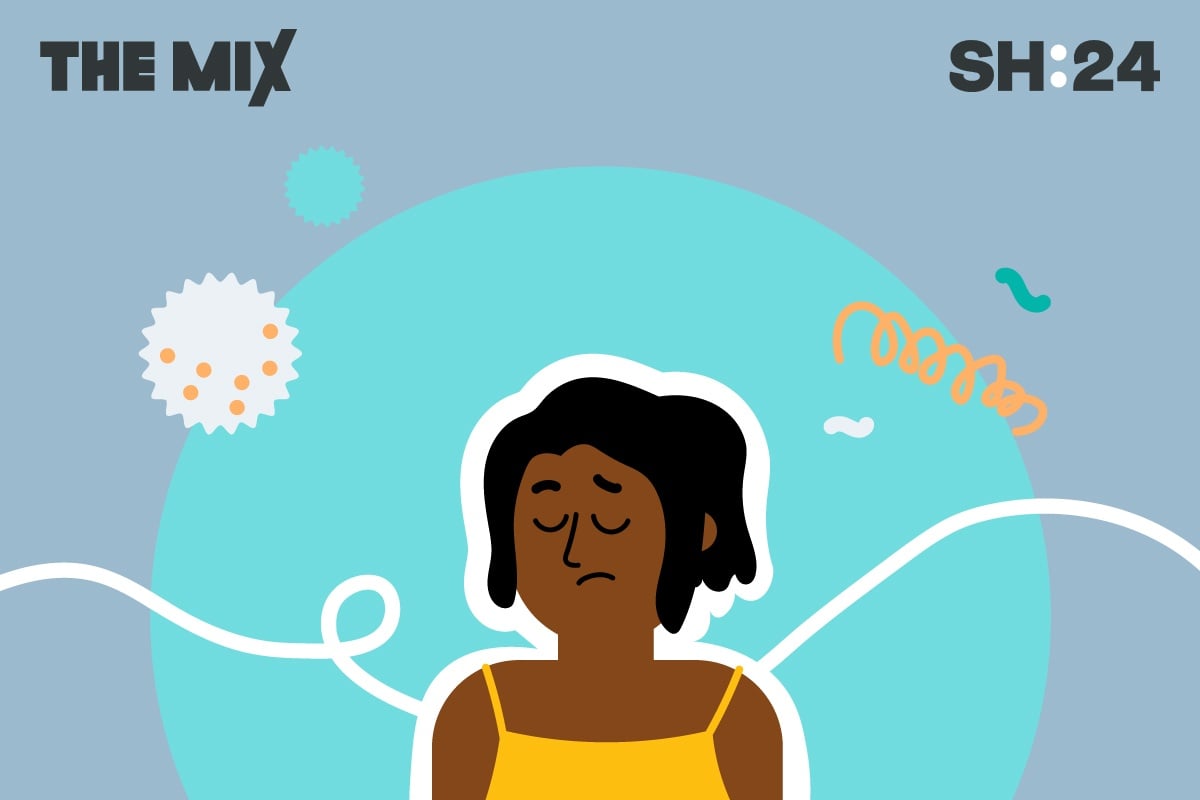Coping with STI anxiety
Sexually transmitted infections (STIs) can be a tricky subject to talk about. Perhaps even the thought of them brings you feelings of unease and anxiety. However, with more people than ever getting regularly tested, and with modern science doing magical things to help us live STI-free lives, there’s little reason to feel anxious about STIs anymore. But sometimes you just can’t help it, right? Whether you’ve got an STI or you’re worried about catching one – The Mix and SH:24 explore how we can manage our anxiety around them.

Am I worrying over nothing?
There’s no short and simple answer to this – other than to test.
If you can’t remember using a condom, or if it’s been a while since your last test – it might help your anxiety to get checked.
There are many organisations that make the testing process easy and confidential, such as SH:24, with most results returned within 72 hours.
Worrying can also be contagious, and if you’re putting off getting tested, it can creep into your sex life and overall wellbeing. You don’t want to be half-way through a moment of passion only to be hit by a little voice in your head shouting ‘chlamydia’ at you.
The chances are that you are indeed worrying about nothing. Nowadays, in this futuristic world of ours, most STIs are curable and all are treatable. So even if you do find yourself with a positive STI result – it’s not the end of the world.
Over 2 million tests were carried out in 2022 – a record number. Most of the time a short course of antibiotics will get you back to living your best sex life.
Waiting for your test results
So you’ve completed a test and sent it off, patiently awaiting the results.
A day feels likes a week. A week feels like a year.
Most sexual health services usually have a quick turnaround, from as little as 48 hours to (normally) no longer than 7 days.
Playing the waiting game can be HARD, but just remind yourself that you’ve done the right thing. Right now, you’ve done all you can do so take a breath and do something that can take your mind off things.
It’s important to reward yourself and take some time to relax. Afterall, taking an STI test is an incredibly brave (and responsible) thing to do.
Treat yourself to THAT takeaway. Watch your #1 feelgood movie. Catch up with a friend.
Do the things that make YOU happy.
Receiving a positive STI result
So you’ve got your test results back and you’ve tested positive (which indicates that you might have an STI). You might be feeling a range of emotions – shock, sadness, shame, guilt, or even more anxiety. All of these are a completely natural response to this situation.
Allow yourself to be present with these emotions. Give yourself the time to process the results and REMEMBER – most STIs are curable and ALL are treatable.
Now it’s time to get some treatment. All sexual health services should provide you with the next steps if you’ve received a positive result.
You might be worried that you’ve potentially passed on an STI to a sexual partner. The right thing to do, and for your own peace of mind, is to let anyone you’ve slept with know about your result so they can get tested too.
This might be a hard conversation, especially if the person you’ve had sex with was a one-night thing. It might help to plan what you’re going to say first. Just because no one talks about them, it doesn’t mean that STIs are uncommon. In that regard, the conversation might go better than you expect.
The conversation can be as simple and as brief as this: ‘I did an STI test recently and I tested positive, so it might be worth taking a test as well’.
Our guide on how to talk about STIs might be worth reading too.
You didn’t ask for an STI, and although we should practice safe sex (especially with people you don’t know very well) we are only human and we make mistakes sometimes.
If the person reacts badly to the news. Remind yourself that you’ve absolutely 100% done the right thing and you don’t deserve any potential abuse. Simply encourage them to take a test and say your goodbyes.
HIV Phobia
We’re a long way from the 1980s when the AIDS outbreak gripped the world, but unfortunately its after-effects still linger.
HIV is now completely treatable and everyone who contracts it can live a long, healthy life with the right medication. Medication also makes it impossible for anyone to pass on the virus.
Despite this, many people still live in fear of contracting HIV/AIDS, often developing an irrational and paranoid mindset that affects their day-to-day life and wellbeing. This condition is called HIV phobia.
Even when the risk factor is incredibly low, it can still have a damaging impact on your mental health. It not only ruins your sex life but also prevents you from doing other things that you enjoy too – from relationships to even going out.
Just like HIV, anxiety doesn’t have to control your life anymore. Speak to your doctor about how you’re feeling – they may recommend that you speak with a counsellor or therapist.
Alternatively, learning more about HIV/AIDS and practicing mindfulness can help alleviate your worries.
Anxiety around STIs is completely normal behaviour. It’s important to recognise the anxiety and remind yourself that our world has never been more proactive with our sexual health.
Organisations like SH:24 are leading the way in ensuring everyone has access to free, quick and easy sexual healthcare to help all of us maximise our sexual and mental health.
Next Steps
- Chat about this subject on our Discussion Boards.
By
Updated on 07-Aug-2024
Sorry, comments closed
No featured article














